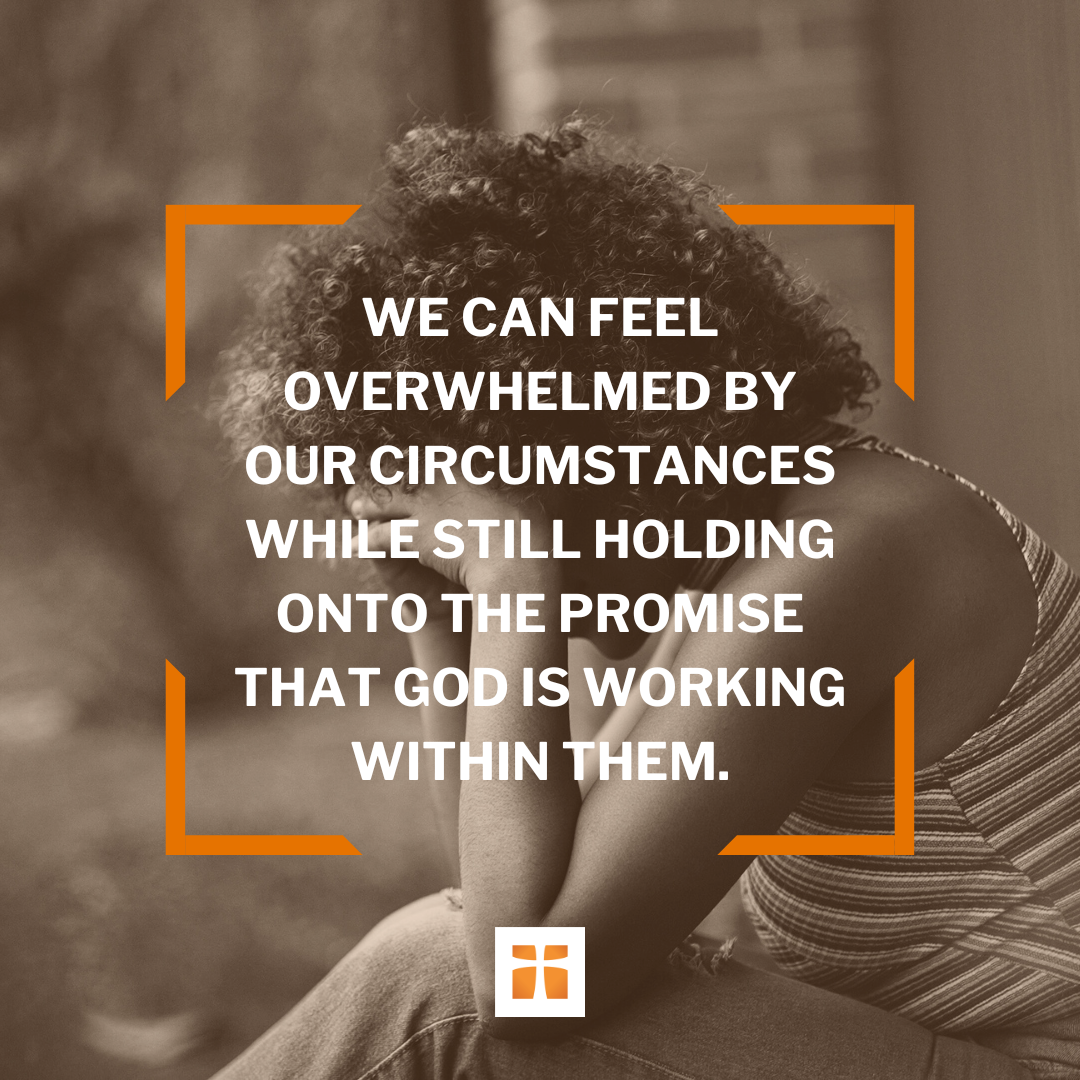When my best friend died of breast cancer, and two years later, on the same day, my dad died of a heart attack, a few well-meaning people flooded me with Romans 8:28: "And we know that in all things God works for the good of those who love him, who have been called according to his purpose."
As you can imagine, those beautiful words felt ugly and complicated for my broken heart.
I've wrestled with this verse over the years, especially as someone who has walked through various seasons of loss and disappointment. How do we hold onto the promise that God works all things for good when nothing feels good about our pain? How do we process this promise of scripture, truth without bypassing or invalidating the reality of suffering, or offering cheap or tone-deaf comfort to those who’ve borne loss?
Maybe the answer isn't found in rushing to explain away tragedy, but in trying to understand what the apostle Paul meant when he penned these words.
Paul writes these words in the middle of a chapter dedicated to the reality of suffering, and from the place of his own pain. He acknowledges that "the whole creation has been groaning as in the pains of childbirth" (v. 22) and that we ourselves "groan inwardly as we wait eagerly for our adoption to sonship" (v. 23). So, though it’s often misused in conversation, this isn't a verse about bypassing pain—it's about finding our foundation, our hope, our purpose within it.
Paul knew suffering intimately. He'd been beaten, imprisoned, shipwrecked, and persecuted. When he wrote about God working all things for good, he wasn't speaking from a place of naivete but from a deep understanding of what it means to hurt and yet hold on for dear life to the gospel.
The verse that follows is crucial: "For those God foreknew he also predestined to be conformed to the image of his Son" (v. 29). In other words, the "good" that God works all things toward isn't necessarily our safety, our happiness, or even our earthly success. It's about our transformation into the likeness of Jesus—a process that so often involves the very suffering we want to avoid.
What Does Good Actually Mean?
We have to learn to redefine our understanding and perspective of "good." Good, biblically, is God's version of good, which is not usually the same as our human understanding of what's good. It's the kind of good that transforms, breaks chains, and gives us resilience. It’s an eternal, supernatural good. It’s a peace that passes all understanding, a shalom, a sense of full justice. It’s a good that glorifies God and shapes our souls into the likeness of Jesus.
We have to be so careful when we consider this because when God is working all things for good, this doesn't mean God causes tragedy or that suffering itself is inherently good—it means that God is so able, and so committed to our ultimate flourishing that He can take even the worst things and weave them into His redemptive purposes.
In other words, God’s good is more mysterious, explosive, and glorious than we could ever ask or imagine.
Think about Jesus himself. The cross was tragic, brutal, and seemingly senseless. Yet God worked even that ultimate tragedy for the ultimate good—our forgiveness, our freedom, our future. The resurrection didn't erase the horror of the crucifixion; it transformed it into something redemptive, for eternity.
Dealing with Loss
When processing any kind of pain, we must learn to do so without rushing to make sense of it. Meaning will come in time. And making meaning in pain is part of what makes us human. But when we're in the midst of tragedy, the last thing we need is someone explaining how this will all work out for good. In those moments, we need presence, not platitudes. We need lament, not lessons. Job's friends got in trouble not because they came to comfort him, but because they couldn't sit in silence with his pain. They couldn’t just let him grieve without trying to “fix” it.
There's a season for weeping, and that season is not the season for citing Romans 8:28 to the hurting. Sometimes the most faithful response to tragedy is to rage against it, to mourn deeply, and to cry out to God in our confusion and hurt. The Psalms are full of this kind of honest, raw emotion. David didn't hesitate to tell God exactly how he felt, even when those feelings weren't pretty or theologically tidy.
Part of my work, writing, and ministry over the years has been to give myself and others permission to feel the full weight of loss without immediately jumping to spiritual explanations. Grief is sacred work, and it can't be rushed or bypassed with Bible verses, no matter how true they might be. God is in the slow work of grief.
Sovereignty, Community, and Long-Suffering
Romans 8:28 also confronts us with the mystery of God’s sovereignty. We live in a world where terrible things happen to good people, where prayers seem to go unanswered, and where God's purposes aren't always clear. This verse doesn't resolve that tension—it asks us to trust within it.
The phrase "we know" in Romans 8:28 matters. Paul didn’t say, "We understand" or "We can guess." But we know. This is a deep, settled confidence—and assurance, a trust—that transcends our circumstances. This is the kind of knowledge that comes from a relationship and intimacy with God. This is what faith looks like in the midst of tragedy—not having all the answers but having confidence in the character of the One who does. Or admitting you don’t have the confidence, but you are crying out to God anyway.
Perhaps the most important thing we can remind ourselves about Romans 8:28 is that it's about redemption, not explanation. God never promised to explain why bad things happen (I wish he did!). Instead, he promises to work within them for our good. He promises to never leave us alone in our tragedies.
I have a friend, a widower who lost his wife in a tragedy, who now ministers to other widowers with unprecedented compassion. I know a woman who struggled for years with shame from insecurity, and now leads others to freedom. I walk closely with a couple who lost a child and started a foundation that has helped hundreds of families. These aren't examples of God causing tragedy for good outcomes—they're examples of God redeeming tragedy for good outcomes.
The difference matters. One makes God the author of evil; the other makes Him the redeemer of it.
As followers of Jesus, we're called to live in the tension between what we can see and what we believe, between our current pain and our eternal hope. Romans 8:28 doesn't eliminate this tension—it gives us a framework for living within it.
This means we can mourn deeply while still trusting deeply. We can rage against injustice while still believing in God's ultimate justice. We can feel overwhelmed by our circumstances while still holding onto the promise that God is working within them.

Another truth that’s helpful for us to remember in our suffering: we don’t have to do it alone. One of the most profound ways God works all things for good is through the community of believers who have walked through similar valleys. When we suffer, we're not just experiencing personal pain—we're being invited into a fellowship of suffering that connects us to others who understand.
This is part of what Paul means when he writes about being "comforted in all our troubles, so that we can comfort those in any trouble with the comfort we ourselves receive from God" (2 Corinthians 1:4). Our suffering can become a source of ministry, our wounds a source of healing for others.
Romans 8:28 also teaches us about God's patience with His own timeline. The "good" that God works all things toward isn't always immediate or obvious. Sometimes we must wait years, even decades, to see how God has woven our pain into His larger story.
Consider Joseph, who spent years in slavery and prison before understanding how God was working his brothers' betrayal for the good of preserving many lives during famine. He couldn't see it while he was in the pit or the prison, but God was working even then.
This requires a different kind of faith—not the faith that demands immediate resolution, but the faith that trusts God's timing even when it doesn't match our own. It's the faith that says, "I may not see how this works for good in my lifetime, but I trust that God sees what I cannot see."
Perhaps most remarkably, Romans 8:28 suggests that God doesn't work all things for good despite us, but with us. We're not passive observers of God's redemptive work—we're invited to participate in it. Our choices, our responses, our faithfulness in the midst of pain all become part of how God works all things for good.
When tragedy strikes, we don't need to rush to find the silver lining or to explain God's purposes. We need to grieve, to cry out, to feel the full weight of our loss. But we also need to remember that our pain is not the end of the story. God is still writing, still working, still weaving even our deepest hurts into redemption, into beauty.
That's not cliché or trite hope—it's costly. It's a hope that was purchased with the blood of the One who suffered most deeply, who understands our pain most intimately, and who promises to work even our darkest moments for good.
Friend, He is with you today if you are hurting. He sees you. He is not afraid of your pain. And he is, somehow, doing something beautiful in it.




.jpg)